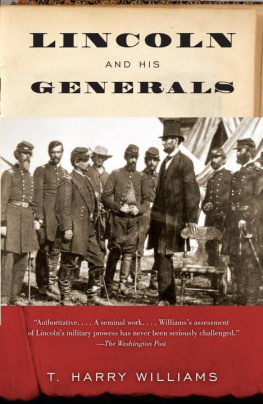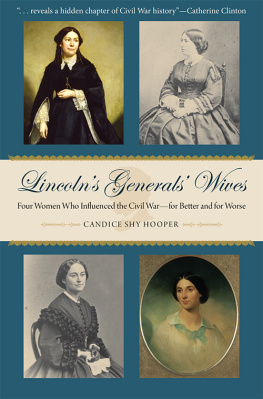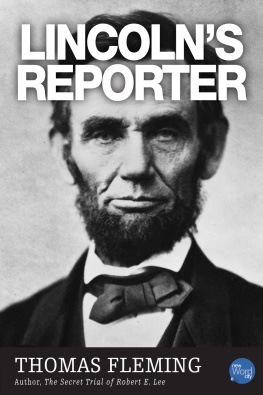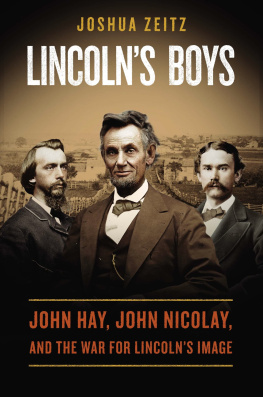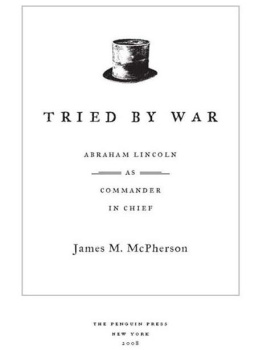To the
122,388 Surviving Followers
Lincoln and His Generals
PREFACE
The visitor to Philadelphia's beautiful Fairmount Park will see on a hill overlooking the Schuylkill River a plain board shanty with the United States flag flying over it. It is the cabin used as headquarters by Grant at City Point on the James River, in 1864 and 1865. In that room the orders were written which directed the far flung armies of the nation in the last year of the Civil War. As one passes the cabin it is not difficult to see, in imagination, some of the chief military and political actors of the great drama: the severe and scholarly Meade, the dynamic Sheridan, the 'superb' Hancock, the thoughtful Warren, the big and manly Burnside, the restless Sherman, with the fire of genius burning in his eyes, the capable Porter, Grant smoking a cigar, a hand thrust into his pocket, and Lincoln with his high silk hat and frock coat, and melancholy countenance.
Of the making of many books about Lincoln there is no end. But in this book the reader is invited to enter a field which has been little traversed by others. Lincoln as a lawyer, as a politician, as an executive, as a story-teller, as an orator, as a master of men, as a man of sorrows and acquainted with grief, we all know. But there is a side to Lincoln's character which cannot be understood save by a study of his relationships with the chief generals of the Union armies during the war. It is that side which I have tried to bring out in this series of papers. In contrast with Jefferson Davis, who had been trained at West Point, who had served in the Mexican War and had been Secretary of War under President Pierce, Lincoln had no knowledge of military affairs, save a brief and rather farcical experience as captain of a company of volunteers in the Black Hawk War. Most of the officers whom Jefferson Davis appointed to high commands at the beginning of the war continued to occupy places of prominence until its close. But in the United States Army generals were exalted one day only to be put down the next. Until Grant came on the stage as commander-in-chief, nearly every great battle saw a new commander for the Union army engaged.
Major-General W. F. Smith said of Lincoln, "I have long held to the opinion that at the close of the war Mr. Lincoln was the superior of his generals in his comprehension of the effect of strategic movements and the proper methods of following up victories. After Bull Run Lincoln gave himself assiduously to the study of the campaigns and mapped out plans of his own. Neither McClellan nor Grant thought highly of the plans which he submitted to them, and the student of Lincoln's relationships to his generals will hardly hold the high opinion entertained by General Smith. The campaigns with which Lincoln had the most to do were the least successful, and those with which he had the least to do were the most successful. After Grant took supreme command Lincoln gave the details of the campaign little attention, for he felt that he now had what he told Grant he had long been waiting for, a man who would take the responsibility and act. Lincoln told Grant when they first met at Washington that he did not profess to know how to conduct military campaigns, but that the procrastination of former commanders and the pressure from the people and from Congress, always with him, had compelled him to take a hand in military matters and issue orders. He confessed that many of his orders were wrong.
If anyone expects that Lincoln will be held up in these pages as a military genius, adding that crown to the many others already resting upon his brow, he will be disappointed. Lincoln was far from that. But he who would have some fresh view of the infinite patience of Lincoln, the peculiar trials and vexations to which he was subjected, the jealousies and quarrels which hampered him, the Gethsemanes of sorrow and disappointment through which he passed, and his magnificent faith in the nation and in the cause, may be repaid by the reading of this book.
CLARENCE EDWARD MACARTNEY
LINCOLN AND SCOTT
History affords few instances of a man so advanced in years bearing such heavy military responsibilities as those which rested on the shoulders of Lieutenant-General Winfield Scott at the outbreak of the Civil War. He was then seventy-five years old, very heavy and unwieldy in body, suffering from a painful affliction of the spine, and for a number of years had been unable to mount a horse. Yet his great age and evident infirmity had not in any way diminished the high regard, and even reverence, in which he was held when the beginning of the conflict made the nation ask itself in whom it could put its confidence. For half a century he had played a great part in the affairs of the nation. Victories such as Lundy's Lane, won in the remote period of the War of 1812, and his more recent successes in the campaign against Mexico, where with a small army of twelve thousand men he conquered a nation, and where his successive victories seemed to revive the memories of Cortez, had won him great military renown both at home and abroad. Nor was he altogether unworthy of this high regard as a soldier and strategist. His Mexican campaign was a splendid piece of military thinking as well as execution, and it has been said that there are few battles where the history of the engagements coincided with the plans and orders of the commander as they did in Scott's battles in Mexico. When the Civil War came, General Scott, although old and infirm, had a far clearer conception of the problems of the war than many a younger officer or statesman. His chief fault was vanity. Grant, who served under him in Mexico, thus refers to this trait: "General Scott was precise in language, cultivated a style peculiarly his own; was proud of his rhetoric; not averse to speaking of himself, often in the third person, and he could bestow praise upon the person he was talking about without the least embarrassment."
In the dark and uncertain months toward the close of Buchanan's administration, Scott understood thoroughly the perilous situation of the United States forts which stood within the states threatening to secede, and urged that measures be taken for their defense. But in this he was balked, partly through the timidity of Buchanan, partly through the treasonable plans of men in his administration, and partly through the lack of means and men. As far back as 1857 Scott had said to Sherman, just returned from California, "The country is on the verge of a terrible civil war." When South Carolina threatened to secede from the Union in 1832 Scott was in command of the forces sent to Charleston by President Jackson, and his experience upon that occasion undoubtedly made him anxious for the outcome of the new agitation.
In October, 1860, he submitted to President Buchanan his "Views suggested by the imminent danger of a disruption of the Union by the secession of one or more of the Southern States." In this document, sent to the president-elect Lincoln also, Scott states his fear that if the Union is broken, an effort to restore it by military force would create a state of anarchy in the nation. As a lesser evil he suggested the formation of four new unions, the Eastern Northern States, the Old South, the Middle West, and the Far West. That so distinguished a man as Scott should have made this curious and preposterous suggestion shows how much men's confidence in the perpetuity of the Union had been shaken.
Before Lincoln came to Washington, Scott had entered into correspondence with him, telling him of his wish to co-operate with him in the effort to save the Union. In response to some complimentary words from the president-elect, Scott wrote, using the third person style to which Grant refers, "Lieutenant-General Scott is highly gratified with the favorable opinion entertained of him by the president-elect, as he learns through Senators Baker and Cameron, also personal friends of General Scott, who is happy to reciprocate his highest respect and esteem. The president-elect may rely with confidence on General Scott's utmost exertions in the service of his country (the Union) both before and after the approaching inauguration." To this Lincoln replied, "Permit me to renew to you the assurance of my high appreciation of the many past services you have rendered the Union, and my deep gratification at this evidence of your present active exertions to maintain the integrity and the honor of the nation."
Next page
